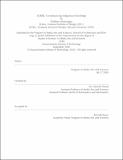SCRIBE : crowdsourcing indigenous knowledge
Author(s)
Muniyappa, Prathima.
Download1227787543-MIT.pdf (29.13Mb)
Alternative title
Crowdsourcing indigenous knowledge
Other Contributors
Program in Media Arts and Sciences (Massachusetts Institute of Technology)
Advisor
Danielle Wood.
Terms of use
Metadata
Show full item recordAbstract
The Ethnosphere is woven into the matrix of the biosphere as a simultaneous duality, and yet cartographers of disciplinary territories raise boundaries to dis-entangle the dialectic dualities: Nature from culture, scientific knowledge from indigenous knowledge and the form from the formless. The project of modernity with its predilection for organizing knowledge into disciplinary silos served to render the boundary between nature and culture impermeable. Myths, folklore ,language and heritage are animating phenomena for the human experience of mediating matter ,establishing networks that permeate boundaries between life-non life, human- other than human, form and the formless. This research will journey through the overt but out-of-sight ecosystem transformations that are instigated from historically muted indigenous tribes and will develop a method of conservation of indigenous knowledge that is in-situ, espouses a critical conservation approach, engages with the issues of indigenous self representation and offers defensive intellectual property protection. It explores the design of a tool called SCRIBE to crowdsource and document oral histories, ecological memory and indigenous knowledge and practices relating to ecosystem management using new media. The tool can be used to and spatially correlate such media alongside earth observation data and scientific studies on resource conservation emerging from the same geographies. Re-positioning two ontologies: the scientific and indigenous, in juxtaposition with one another, dismantles the false divide between these two categories and presents an opportunity to combine two sets of data sources that are rarely ever combined, and privilege vastly different ways of knowing. In crystallizing process into product and research into a technology that can be used for conservation, the thesis will seek to dwell deeply on devising the methodology of interaction with the communities, on the co-creation of a structure of engagement, of humbling learning from both their knowledge and their ontologies. This will inform the design principles for a tool that can address the complex questions of justice that underly the politics of knowledge conservation.
Description
Thesis: S.M., Massachusetts Institute of Technology, School of Architecture and Planning, Program in Media Arts and Sciences, September, 2020 Cataloged from student-submitted PDF version of thesis. Includes bibliographical references (pages 102-106).
Date issued
2020Department
Program in Media Arts and Sciences (Massachusetts Institute of Technology)Publisher
Massachusetts Institute of Technology
Keywords
Program in Media Arts and Sciences